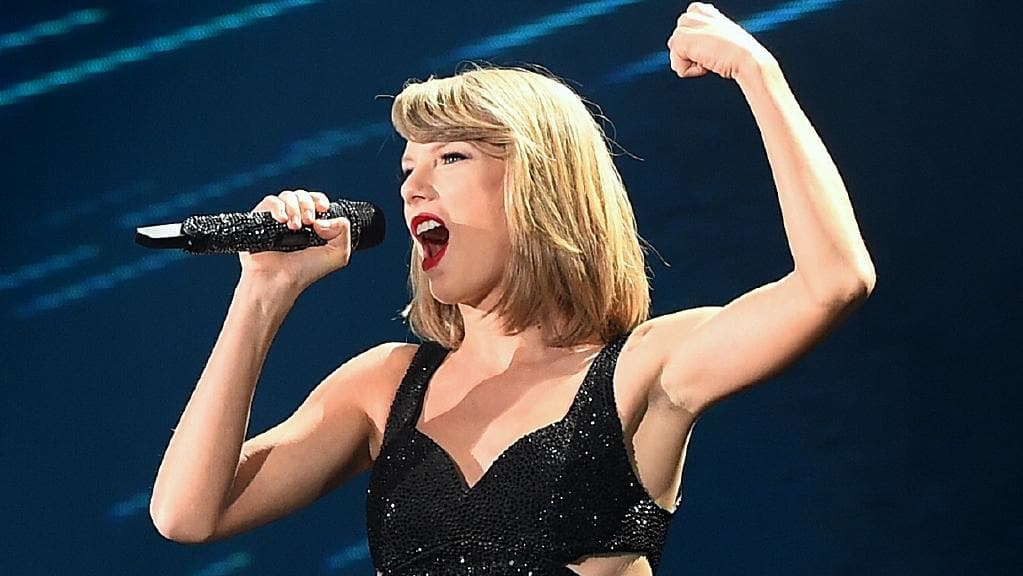Masters: What Are They & Why Everyone Wants Them
Posted: by admin

Image from the Herald Sun
There are a lot of other things I should be doing right now, but for once everyone is talking about Master ownership (thanks T Swift), and I can’t let this moment go to waste. As some of you might know, I’m a music lawyer, so Master ownership is the type of stuff I’ve stayed up late thinking about every night for a few years. Become a lawyer, never rest.
Whether labels should own artists’ Masters or not is a huge issue in the music industry right now, and something that all artists, labels, and even music fans need to think about. But that is kind of hard to do when very few people even have a handle on what these things are, so I wrote a bit about what a Master is, why labels want them, and why artists shouldn’t give them up so easily. If you follow my instructions, you’ll even own a few Masters by the end of this article.
Obviously, all of this isn’t official legal advice and shouldn’t be used to represent yourself. Please just hire a lawyer to protect your art, it doesn’t even have to be me.
MASTER COPYRIGHTS
Master Copyrights aka Masters are really just recordings of songs. The copyright exists automatically when the song is recorded. Take out your phone and record yourself singing any song (I prefer Sum 41’s “Fatlip”). You are now the proud owner of a master copyright! If that one sucks, just record yourself singing the same song again. Now you own 2! It’s that basic.
Musical Compositions are the flipside of Masters. Musical Composition Copyrights are the lyrics and melody that make up a song. They are harder to get than Masters because you have to write a new song. Take out your phone again and record yourself freestyle rapping a few bars. You are now the proud owner of a copyright in a Musical Composition, (probably not a good one), but you also now have another Master copyright because you recorded another song! Now you’re a multiple copyright owner, and we are able to discuss your label options.
I bet you are thinking it’s not that easy, and that you heard somewhere that you have to register copyrights with the government. Well that’s kind of true! Registration makes it easier to sue to protect your rights, BUT you become the owner of the copyright as soon as a song is recorded, so I’m not messing with you. If you really recorded yourself, you are a real copyright owner.
The Master is the recording and the Musical Composition is the song. You would think the Musical Comp would be the more valuable one because it’s a new song, but nope! The Master is what gets almost all the money from record sales and streaming. Master streaming royalties are about 4 times the size of Musical Comp royalties for the same amount of plays. Some people (me) think that’s messed up, but we aren’t in charge (yet). Moving on!
LABELS AND MASTER OWNERSHIP
Labels do not usually get a cut of the money from the Musical Compositions, so instead, Labels go for the Master money through record sales, licensing, and increasingly importantly streaming royalties. If you’re wondering, Music Publishers (record labels for songwriters) go after the Musical Comp money. Okay, now that we’ve covered the basics, its time to get to Master Ownership and why Taylor Swift is saying her enemy now owns her life’s work.
When lawyers and labels talk about Master Ownership they are really talking about the length of ownership, because eventually the song gets so old that it becomes free for the public which is called public domain (95 years in the US). That means that the Master can only make money for a certain amount of years. The first question is usually what % of the Master money does the label get when a band signs, but the even bigger question is for how long? For most of the history of the music industry, the answer has been the entire life of the song aka all the years. Labels traditionally became the “Master Owner” and got their cut of the Master money (which is often almost all of the Master money) until the song is public domain. Luckily for artists, that is changing.
This practice was so clearly abusive that even the government realized it had to go, so a few years ago a bipartisan group passed a law that allowed anyone a chance to get out of any Master or Musical Composition contract after 35 years. A few big labels are fighting against the new law, but it looks like “Master Ownership” at least now has an escape clause after 35 years. 35 years is a lot better than eternity, but it’s still a long time, and that’s 35 years at whatever terms the artist originally signed to, even if that deal was signed when they were a child. eek.
That’s why Taylor is pissed! Her old label owns her Masters for her first 6 albums, and wouldn’t sell them back to her because #1 they don’t have to if they don’t want to and #2 I guess she wouldn’t offer them enough money to get them to change their mind. Even worse, the entire label (her Masters included) was then sold to her rival, who is course named Scooter, (Kanye’s manager), and now he gets a huge cut of the money from all of her releases (except for the newest LP) for 35 years. Depending on the contract she signed, he could use her songs in embarrassing ways (Trump commercials), or bury her songs in debt so they never profit again. I doubt he will do either of those things, but even still, its a nightmare scenario.
WHAT IS THE ALTERNATIVE?
The alternative to a Master Ownership deal is what is known as a license deal. License deals have become the standard in many smaller indie labels, and they have even begun to take hold at major labels. Taylor got one on her new album for instance. A license deal basically means that the label has control of the Master for a certain amount of years usually 10-20, and during that time the label and the artist split any money that comes out of the Master however way they decided in the terms of their agreement. It’s not that complex! The hard part is getting any of the bigger labels to agree to something like that, without them getting the artist back in 300 other ways. This is especially true of up and coming artists who don’t have any leverage yet.
WHAT SHOULD ARTISTS DO?
Well obviously, government reforms in this massively exploitative industry would be nice… maybe something that lowered that 35 year threshold, or even better a max cap on the % of Master royalties that a label can take. But barring those decisions, Artists need to work to protect themselves.
A good lawyer or manager or preferably both, is crucial to protect the ownership of an artist’s Masters, because they are going to have some tough negotiations with labels. Labels want that Master Ownership because to them it’s a long-term security blanket. The game plan for Labels pretty much since day 1 of their existence was to create a huge pile of valuable Master copyrights, and then use those to sustain themselves while they collect more, so they aren’t going to give them up easily.
Even still, Artists need to realize that their copyrights are one of their most valuable assets, and that giving them to a label or a music publisher or anyone else, needs to be a valuable exchange. If the label can’t offer much, they shouldn’t get so many years. If they can legitimately offer the world, maybe they deserve 35. When negotiating deals Artists should prioritize Master control and term length over short term profits. As Taylor Swift has shown, once the deal is signed its very difficult to get your Masters back no matter how many resources you have. Remember walking away from a deal and self releasing is so much better than a bad contract that you are locked into.
Every artist must decide for themselves based on their situation, but eventually artists and managers and everyone else involved, need to realize that pushing for these things together can improve the situation for everyone. Licenses could very quickly become the norm if artists refused to sign anything else. Say what you want about Taylor Swift’s politics, but at the very least she is very openly pushing for Master control and discussing its importance. Other artists should be taking note.
_
Henderson Cole // @HendoSlice
The Alternative is ad-free and 100% supported by our readers. If you’d like to help us produce more content and promote more great new music, please consider donating to our Patreon page, which also allows you to receive sweet perks like free albums and The Alternative merch.










